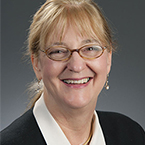By: Sandra G. Hassink, MD, FAAP
Measles is not a mild disease. Neither is
whooping cough,
Hib meningitis, or
rotavirus. These are diseases that cause parents to make worried middle-of-the-night phone calls to their doctor, race to the emergency department, and spend days nursing a sick and miserable child. And this suffering is completely avoidable with
vaccines.
As a pediatrician, I recommend and do what is in the best interest of my patient based on the scientific evidence. As a parent, I do whatever I can to prevent illness in my child.
As a physician, giving parents the advice that it's ok to skip vaccines, or that measles is not a big deal, is harmful and dangerous. It ignores the fact that immunizations are one of the most effective strategies we have for preventing disease.
To be perfectly clear, there is no "alternative" immunization schedule. Delaying vaccines only leaves a child at risk of disease for a longer period of time … it does not make vaccinating safer. There is no alternative if you want the optimal protection for your child.
Why This is Important:
The ability to prevent suffering is one of the things that mean the most to me as a pediatrician. My colleagues share this belief. I have heard from many pediatricians who are working exceptionally hard in their communities to protect our most vulnerable children from the real threat that these diseases pose.
Why Pediatricians Worry:
The science is overwhelming that vaccines are
safe and effective. But pediatricians worry that parents' doubts about vaccines will prevent families from getting their children the immunizations they need. We worry that parents won't realize the urgency to vaccinate on time. We worry about families who lack access to medical care or transportation and fall behind on their child's immunization schedule. These gaps in the shield of protection that immunizations provide leave our entire communities more vulnerable, including children who are too young to benefit from vaccines and those who cannot be vaccinated due to medical problems.
Because we worry about the children in our care, pediatricians spend hours each day counseling families and answering their questions about vaccines. A
study published in
Pediatrics surveyed more than 500 pediatricians across the country and found 93 percent of them have some parents in their practice who ask to spread out their child's vaccines. Delaying vaccines puts these children at additional risk. The vast majority of pediatricians reported they continue to work with these families in hopes they will agree to timely vaccinations.
The Best Way to Protect Your Child:
The recommended schedule of immunizations has been researched and documented to be the most effective and safe way to protect children. The vaccines are carefully timed to provide protection when children are most vulnerable, and when the vaccines will produce the strongest response from the child's immune system.
The American Academy of Pediatrics, and its 67,000 members, urges parents to make the decision to immunize. Pediatricians strongly recommend timely vaccinations because of what we know to be true:
Vaccines are simply the best way to protect our children from these viruses and bacteria that can cause real and devastating harm. Just as you would never leave home without buckling your child into a car seat, vaccines will protect your child from infectious diseases that are impossible to anticipate. We all have enough worries in our lives. Let's give ourselves the peace of mind that we have done everything we can to protect our children from these preventable diseases.
Additional Information:
About Dr. Hassink:
 Sandra G. Hassink, MD, FAAP, is a past president of the American Academy of Pediatrics. Dr. Hassink is recognized internationally as an expert in child obesity prevention. In addition to numerous articles for pediatricians and parents, she is the author of “Pediatric Obesity: Prevention, Intervention, and Treatment Strategies for Primary Care,” and “Achieving a Healthy Weight for Your Child.” Follow Dr. Hassink on Twitter
here.
Sandra G. Hassink, MD, FAAP, is a past president of the American Academy of Pediatrics. Dr. Hassink is recognized internationally as an expert in child obesity prevention. In addition to numerous articles for pediatricians and parents, she is the author of “Pediatric Obesity: Prevention, Intervention, and Treatment Strategies for Primary Care,” and “Achieving a Healthy Weight for Your Child.” Follow Dr. Hassink on Twitter
here.